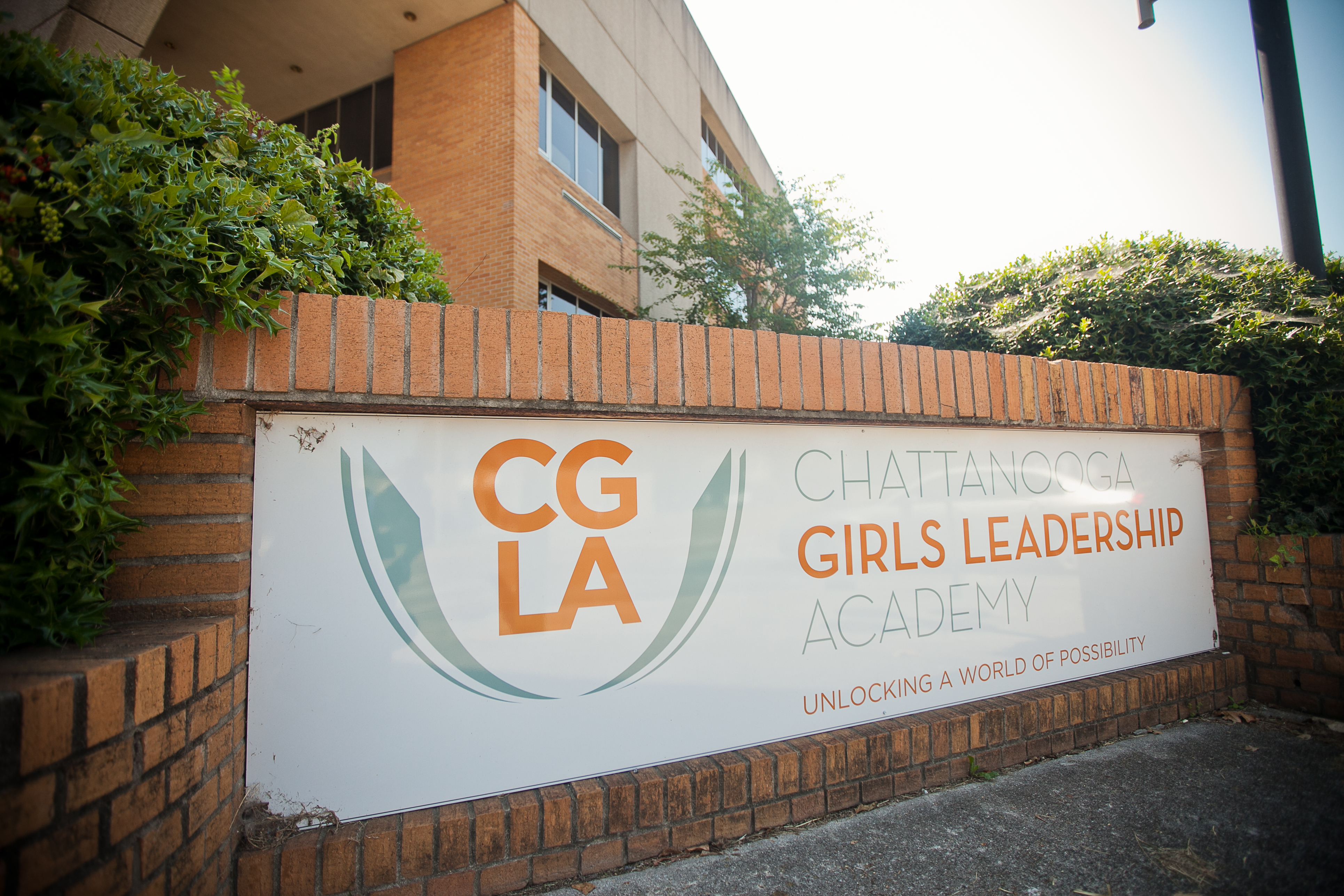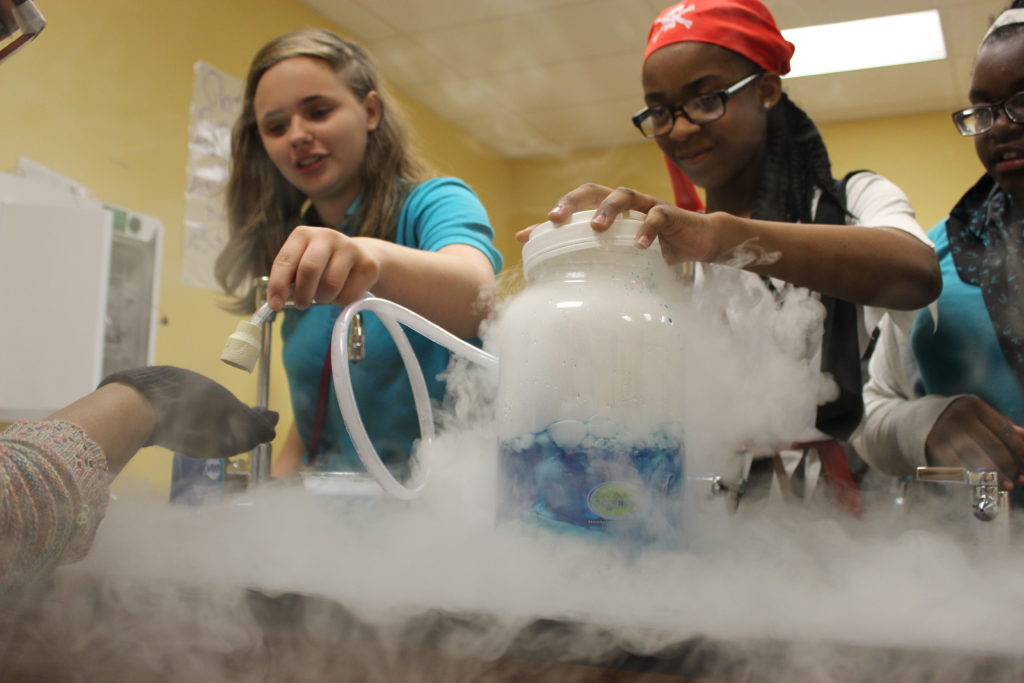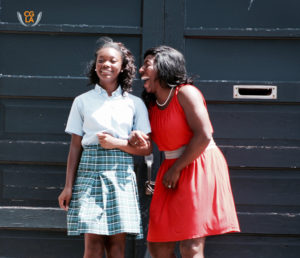
Boosting Young Girls’ Success
Boosting Young Girls’ Success
The Chattanooga Girls Leadership Academy, Tennessee's first and only all-girl charter school, is achieving remarkable results both in and out of the classroom for its students.
At the Chattanooga Girls Leadership Academy (CGLA) in Chattanooga, Tennessee, the school I co-founded, students pursue a challenging STEM curriculum—Science, Technology, Engineering and Math—that the school calls “STEAM,” because the Arts are integrated into every aspect of learning.
But that’s only part of their education. By the time they graduate, some students will know how to ride and care for wild mustangs. Others will have competed on the region’s top robotics team. And all of them will know how to properly use silverware at a business lunch and how to take command of a room. Visit any classroom, and a student will stand up, shake your hand and make sure you feel welcome. As a public charter school serving mostly inner-city girls from failing schools, CGLA’s curriculum and comprehensive, “whole person” approach to educating students is unique in Tennessee, and maybe even in the United States.
As a graduate myself of an all-girls high school in Chattanooga, I had a profound appreciation of the benefits of single-gender education—the confidence building, camaraderie and focus on unique learning needs—and wanted to extend this opportunity to girls from less advantaged backgrounds. So in 2008, I assembled a group of local educators to talk about founding a 6th- to 12th-grade school for such young women. It would be the first (and so far, the only) public charter single-gender school in Tennessee.

Chattanooga Girls Leadership Academy is the first and only single-gender charter school in Tennessee.
CGLA is open to all girls in Hamilton County through a first-come, first-served application process. The 350-girl student body is 94 percent minority, and 92 percent low income. Three-fourths of the girls arrive in 6th grade one to two grade levels behind in reading. But by the time they finish their time with us, they will have not only caught up with their peers but excelled.
One measure of their success can be seen in how well they do on the standardized ACT college admissions test. Before the graduating class of 2016, not one of our junior or senior girls received a composite score of 20 or above on the ACT (21 out of 36 is the national average composite score). This year, 10 juniors out of 29 test takers have already hit the 25 mark in at least one of the test’s four subcategories, and four scored 25s or above – that’s the top 75th percentile or higher – across the board. This is a remarkable achievement considering the average ACT score nationally for African American students is 17.0 (CGLA’s student body is predominantly African American). Due to these achievements—and CGLA’s comprehensive college success program—CGLA’s students enter college at a much higher rate than graduates across the nation. In 2016, 90 percent of CGLA graduates enrolled in college (compared to 69 percent nationally and 62.5 percent in Tennessee). And this college-going rate continues to rise, with 96 percent of our 2017 graduating class planning to go to college this fall.

CGLA students pursue a science and math curriculum the school calls “STEAM” that incorporates arts education as well.
What’s our formula for success?
First, the school maintains a 16:1 teacher-to-student ratio that would be impressive in any private school. But private school students probably wouldn’t put in the hours our kids do, with 182 full student days of school a year with school time that, for many, lasts from 7:20 AM to 5:15 PM.
Second, given our ambitions, it is vital that the girls have access to technology: many of our students have no access to the Internet at home. We solved this problem with the help of a $250,000 competitive grant we won from the state, together with an additional $65,000 from Unum specifically earmarked for technology needs, which enabled us to issue Chromebooks to each of our students. The generosity of a private donor last fall provided the final step: personal Wi-Fi hotspots. Our executive director, Dr. Elaine Swafford, called it “Christmas in October.” “Those girls went home that night with something many of us take for granted but they’d never had—the internet,” says Swafford.
Thanks to this technology, we are able to run quarterly STEM/STEAM nights when students must make a problem-solving presentation. This might be a demonstration from the school’s robotics team, whose 15 girls topped the Chattanooga area in competition this year. (They were the area’s only all-girl team.) Or the efforts of a group of students who, when informed that the Chattanooga Lookouts minor league baseball team didn’t have a kids’ zone in its stadium, competed in researching and presenting a plan for one to the team’s president.
Students are backstopped by three levels of mentorship, which is another element of our strategy. In addition to peer-to-peer guidance and adult-to-student mentoring inside the school, students also have the benefit of a workplace mentoring program, where about 12 companies take kids in for monthly internships.
There are other life-changing opportunities as well. To prepare the girls for the unfamiliar worlds they may encounter beyond school, CGLA puts each student through an etiquette program that helps them learn how to “own” a room. That covers everything from table manners to personal introductions. Fourteen girls a year also join me for our Mustang Leadership Partners program, where they learn to work with and ride wild mustangs we rescue and train on my family’s farm. The confidence the students gain in learning to control a 1,500-pound animal is priceless. The program puts them through a challenging experience that, we hope, instills skills they need to tackle other difficult situations in their lives. In fact, one of the girls told me that “the relationship with the horses [became] a way to relieve all the stress” she faces outside school.

CGLA students learn to “command a room” in addition to what they learn in their books.
The final, vital, element of our strategy is leadership. Because of CGLA’s comprehensive and ambitious approach to education, we needed a leader with a blend of vision, compassion and toughness. In 2012, we recruited such a leader in Swafford, who came to us from a post at Chattanooga State Community College.
In a world of confusing platitudes and professional jargon, Swafford’s direction is clear as a comet. A typical Swafford statement: “I believe you need to feed the human spirit before you can push Algebra 1 down someone’s throat.”
Feeding the human spirit requires empathy from teachers, too. Before school starts in August, Swafford loads her faculty onto a bus and takes them to the neighborhoods their students call home. Some of these places are a rude shock for first-time visitors. But Swafford believes educators need to “see the clotheslines,” she says, referring to the real thing – dryers are rare—and the reality of their lives. “Teaching kids is a hard job and an important one,” says Swafford. “You might know the ‘what’ of how they respond to things. But, to be a real teacher, you’ve got to know the ‘why.’”
For all her efforts with the human spirit—and, yes, with algebra—Swafford works with a $4.2 million budget. The state provides about 75 percent of CGLA’s per-student expenditures, but the school raises the remainder through donations, grants and benefits. There is a golf tournament and even a Publix CGLA partner card.
But CGLA wasn’t an easy sell at the beginning. Members of the skeptical local school district felt we would cherry-pick the best students from other schools and drain money from the county. We pointed out that we would actually be taking on struggling children from struggling schools—at that time, the law required it.
But it helped that, from the get-go, we had backing from believers – the Clarence E. Harris Foundation, the Community Foundation of Greater Chattanooga, and the Weldon F. Osborne Foundation among them—which have donated a total of about $1.2 million since 2009. In addition, a roster of some 200 supporters have contributed more than $1 million to start the school and keep it humming. Thirty foundations have given a total of $2.8 million to support CGLA programs and needs. And the school has received more than $1.2 million from the Tennessee Department of Education to support school reform efforts, technology integration, and afterschool programming.
Today, CGLA’s program might be a little out of the ordinary but our goals are fairly simple. As Swafford puts it: “I was raised poor, too, and I know what it feels like when you don’t think you belong somewhere. Well, these girls belong where everyone else belongs and they need to let people know it: Walk into a room with your spine straight, look people in the eye and shake their hand.”
As they say, it takes a village to raise a child. And sometimes we have to create that village from the ground up.
Sue Anne Wells is Co-founder of the Young Women’s Leadership Academy Foundation.
Project
Chattanooga Girls Leadership Academy
Philanthropy
Young Women’s Leadership Academy Foundation


